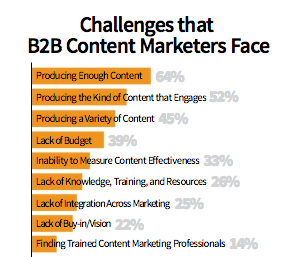We had written about a Curata content marketing survey some months ago. Now, I came across another research which is making it’s way through the web, and I am glad as I have been asked at a University St. Gallen event for some new insights on the topic today.
The Content Marketing Institute’s 2013 benchmarks shows what the challenges for marketers are: producing enough content (64%), producing the kind of content that engages an audience (52%), or producing a variety of content (45%).
Sounds like we have heard that before, right…?
If you think lack of budget is still the issue, you might find yourself being in the wrong corner. Just 39% of the respondents said that they lack budget. Furthermore, traditional restrictions and limits like buy-in/vision (22%) or finding trained content marketers (14%) is falling out; not even senior level buy-in is their biggest challenge (7%).
All lies? Well, seems like that… And when just 14% say, they are having problems hiring in this field, i would suggest some clever journalists or PR managers have found a way to market themselves.
 So, a questions arises that also came up today in my moderation: What is the real issue, why marketers don’t challenge the content marketing business?
So, a questions arises that also came up today in my moderation: What is the real issue, why marketers don’t challenge the content marketing business?
We have probably all heard what Outbrain told us today in their speech that push is the new pull, advertising becomes marketing, creation the modern editorial, campaigns are the always-on of tomorrow which makes sprints the new marathons. Still, the question is whether marketers understand why this should become the new budget engine for a change in an emerging shift towards content marketing and away from advertising?! Maybe marketers need to understand what makes them a media-house? Content curation, distribution and measurement might be more of a big bang theory to address…
 Spot On!
Spot On!
The challenge might actually arise in the definition where content marketing gets propelled. Many marketers see still search engine advertising (SEA) their wholly grail. If companies get turned around into SEO engines, the whole result-driven aspect of the fluid content marketing world would not be questioned any longer. It just depends on getting the right people engaged inside the office and to find the commitment that lets the formerly outsourced world stand in the shade. And have companies ever understood the value of content? Content is not a test budget! It is an attitude towards business, towards communication, towards social business. Or have you ever put into question why you send out newsletters, flyers, whitepapers, or even company brochures? Blogs, status updates, tweets… written in an intelligent way, is increasing the way your conversations will arise…
Are you really hiding in the content marketing fields, marketers – or is it a real challenge…?




 So, a questions arises that also came up today in my moderation: What is the real issue, why marketers don’t challenge the content marketing business?
So, a questions arises that also came up today in my moderation: What is the real issue, why marketers don’t challenge the content marketing business? Spot On!
Spot On! Consumers are multitasking and using other electronic devices like phones or tablets when watching television. This is the conclusion of a recent third annual Video Over Internet
Consumers are multitasking and using other electronic devices like phones or tablets when watching television. This is the conclusion of a recent third annual Video Over Internet 
 These are the main findings of the study….
These are the main findings of the study….
